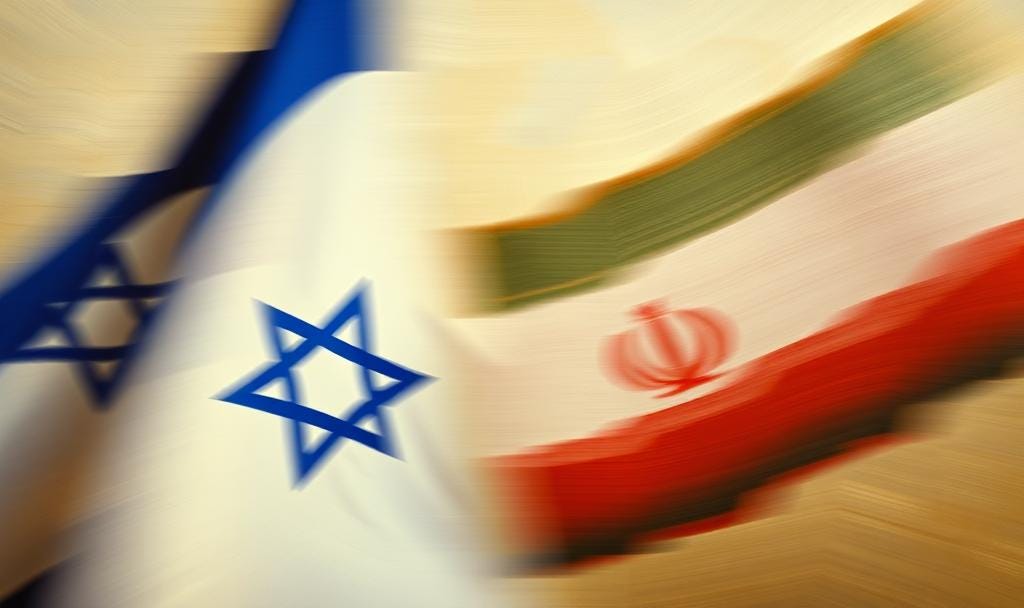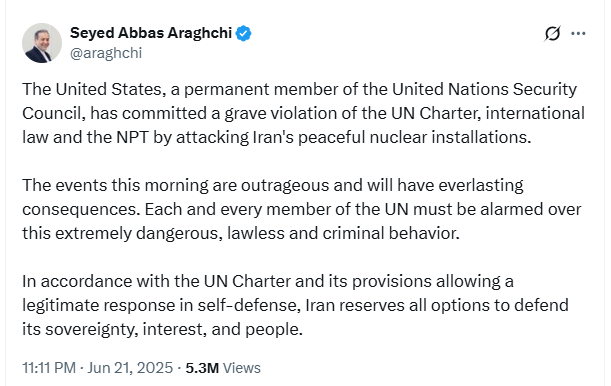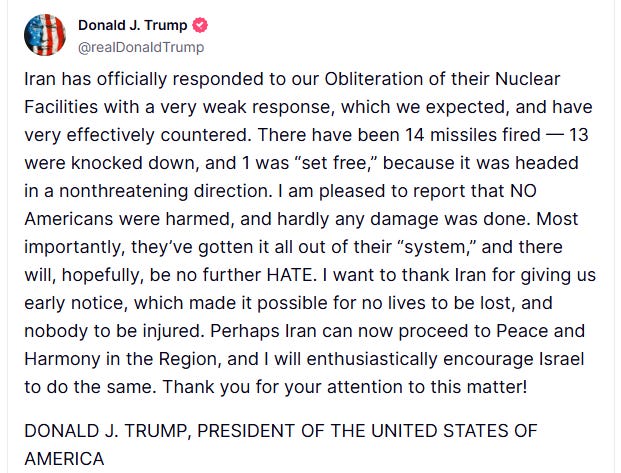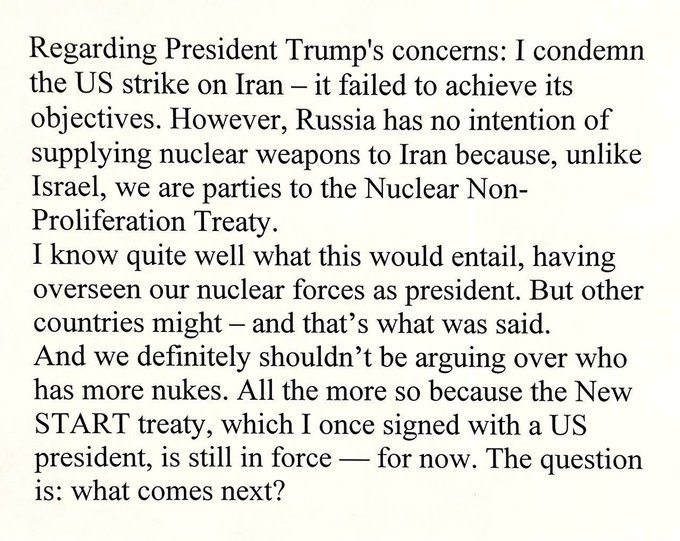Will Trump continue his Israel First foreign policy?
Can the Middle East be defined by commerce, not chaos?
“I don’t want to use an example of Hiroshima, I don’t want to use an example of Nagasaki, but that was essentially the same thing. That ended that war. This ended the war.”
- President Donald Trump
Did the atomic bombs effectively end World War II or mark the beginning of the Cold War with the Soviet Union which followed? Does anyone who speaks into President Trump’s ear know enough history to advise him on how a global conflagration begins or ends?
The president’s current understanding of geopolitical realities in the Middle East may be summarized in a way only Trump could say as President - “We basically have two countries [Israel and Iran] that have been fighting so long and so hard that they don’t know what the fuck they’re doing.” Living thousands of miles away from the conflict, many Americans may feel similarly. But then why did the US actively participate?
America’s reticence to enter foreign wars stretches back more than 100 years. Decades after a bloody civil war between brothers on American soil, the anti-war sentiment was evoked by none other than the man who would eventually call on Congress to join World War I. Excerpts from President Wilson’s 1914 message on neutrality:
I suppose that every thoughtful man in America has asked himself, during these last troubled weeks, what influence the European war may exert upon the United States..
The spirit of the Nation in this critical matter will be determined largely by what individuals and society and those gathered in public meetings do and say, upon what newspapers and magazines contain, upon what ministers utter in their pulpits, and men proclaim as their opinions on the street..
..this great country of ours, which is, of course, the first in our thoughts and in our hearts, should show herself in this time of peculiar trial a Nation fit beyond others to exhibit the fine poise of undisturbed judgment, the dignity of self-control, the efficiency of dispassionate action..
Shall we not resolve to put upon ourselves the restraints which will bring to our people the happiness and the great and lasting influence for peace we covet for them?
America first, living in peace thousands of miles away from foreign regional conflicts has been central to the American spirit since before every American today was born.
On Sunday, Secretary of State Marco Rubio said America’s mission in Iran, “was not an attack on Iran, it was not an attack on the Iranian people. This wasn't a regime change move. This was designed to degrade and/or destroy three nuclear sites related to their nuclear weaponization ambitions, and that was delivered on yesterday."
Vice President JD Vance when asked about the US military operation told Meet the Press, “ I certainly empathize with Americans who are exhausted after 25 years of foreign entanglements in the Middle East. I understand the concern. But the difference is that back then we had dumb presidents and now we have a president who actually knows how to accomplish America's national security objectives. So this is not going to be some long, drawn-out thing. We've got in. We've done the job of setting their nuclear program back.”
Senior officials at the Department of Homeland Security and the FBI in response to the US military strikes in Iran held conference calls on Sunday with governors, their staffs and hundreds of law enforcement officials to discuss how the US military operation in Iran may impact safety and security in their states in the immediate aftermath.
Israeli Prime Minister Benjamin Netanyahu publicly declared “Congratulations, President Trump. Your bold decision to target Iran’s nuclear facilities with the awesome and righteous might of the United States will change history. In Operation Rising Lion, Israel has done truly amazing things. But in tonight’s action against Iran’s nuclear facilities, America has been truly unsurpassed. It has done what no other country on earth could do.”
Iranian Foreign Minister Abbas Araghchi posted on X:
Shortly thereafter, Iran responded by attacking a US Air Base in Qatar, but only after notifying the United States it would attack and effectively preventing the loss of American lives:
Trump reiterated the administration’s position yesterday on Air Force One in regards to regime change in Iran, “I don’t want it. Regime change takes chaos and, ideally, we don’t want to see much chaos.” Global reaction however does not share the president’s belief peace and harmony is on the way.
China strongly condemned the attacks and thinks “the actions of the United States seriously violate the purposes and principles of the UN Charter and international law, as well as Iran's sovereignty, security, and territorial integrity. They have exacerbated tensions in the Middle East and dealt a heavy blow to the international nuclear non-proliferation regime.”
Former Russian President Dmitry Medvedev posted on X:
A leaked Defense Intelligence Agency assessment indicates that the American attack only set back Iran’s nuclear program by less than six months. Iran has more than 30 nuclear facilities and several are securely deep underground. According to NPR reporting, the US strikes likely missed Iran’s uranium stockpiles. Commercial satellite imagery days before the attack show trucks sealing tunnel entrances to where Iran stores their uranium. “[Independent] experts believe Iranians could have also moved their enriched uranium out of the sites in the run-up to the U.S. strikes.”
Europe has called for further diplomacy, and currently a tentative ceasefire is being observed. While Trump attends the NATO summit this week touting his legitimate success of having NATO members raise their defense spending levels from 2% of GDP to 5%, actors in the Middle East are likely still plotting what comes next.
In Paris on Monday, Crown Prince Reza Pahlavi, the last shah of Iran, held a press conference to announce he would form an opposition front to secure a regime change. He said “This is our Berlin Wall moment” and added “We stand at a crossroads: One road leads to bloodshed and chaos. The other — to a peaceful and democratic transition.”
America is very familiar with an exiled official boasting of a return to democracy in their homeland if the regime is toppled. The President himself over the weekend posted on Truth Social:
Though Trump has walked back that sentiment, those in the region have harbored it for decades. A few months prior to the Obama administration finalizing the Joint Comprehensive Plan of Action, which limited Iran’s enrichment of uranium in exchange for lifting economic sanctions, Netanyahu delivered a speech in March 2015 to the United States Congress:
Iran's goons in Gaza, its lackeys in Lebanon, its revolutionary guards on the Golan Heights are clutching Israel with three tentacles of terror..
I don't believe that Iran's radical regime will change for the better after this deal. This regime has been in power for 36 years, and its voracious appetite for aggression grows with each passing year. This deal would only whet Iran's appetite for more.
Netanyahu failed to sway President Obama and reportedly President George W. Bush before him. In General Wesley Clark's book Winning Modern Wars in 2003, Clark describes a conversation he had with a military officer in the Pentagon shortly after the 9/11 attacks:
As I went back through the Pentagon in November 2001, one of the senior military staff officers had time for a chat. Yes, we were still on track for going against Iraq, he said. But there was more. This was being discussed as part of a five-year campaign plan, he said, and there were a total of seven countries, beginning with Iraq, then Syria, Lebanon, Libya, Somalia, Sudan and finishing off Iran.
If accurate, Israel and Netanyahu have been plotting a regime change in Iran for more than 20 years (at least).
When President Trump spoke at his first official foreign trip of his second term, he boldly declared a new world order in which he called upon responsible nations to “put aside your differences and focus on the interests that unite you, then all of humanity, will soon be amazed at what they will see right here in this geographic center of the world.” He wanted all to believe that “Before our eyes a new generation of leaders is transcending the ancient conflicts of tired divisions of the past and forging a future where the Middle East is defined by commerce, not chaos.”
From thousands of miles away, there are moments when that vision can appear to be true. But as a former American president failed to do, our current president must allow other nations to solve their own problems and truly be America First by “[exhibiting] the fine poise of undisturbed judgment, the dignity of self-control, the efficiency of dispassionate action.”





